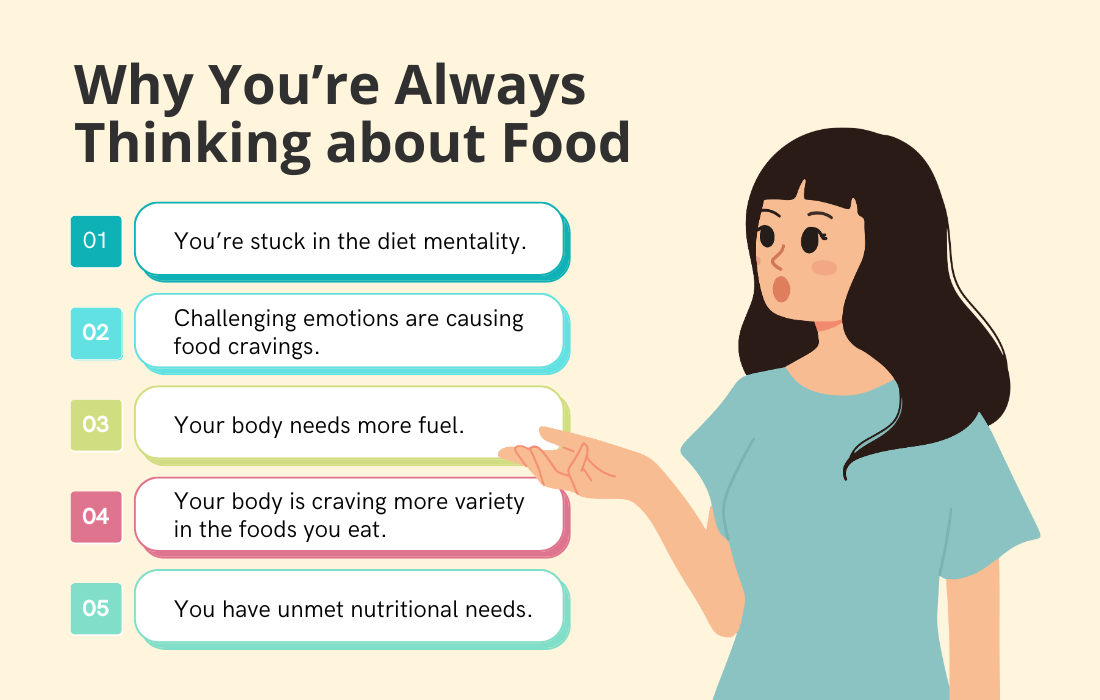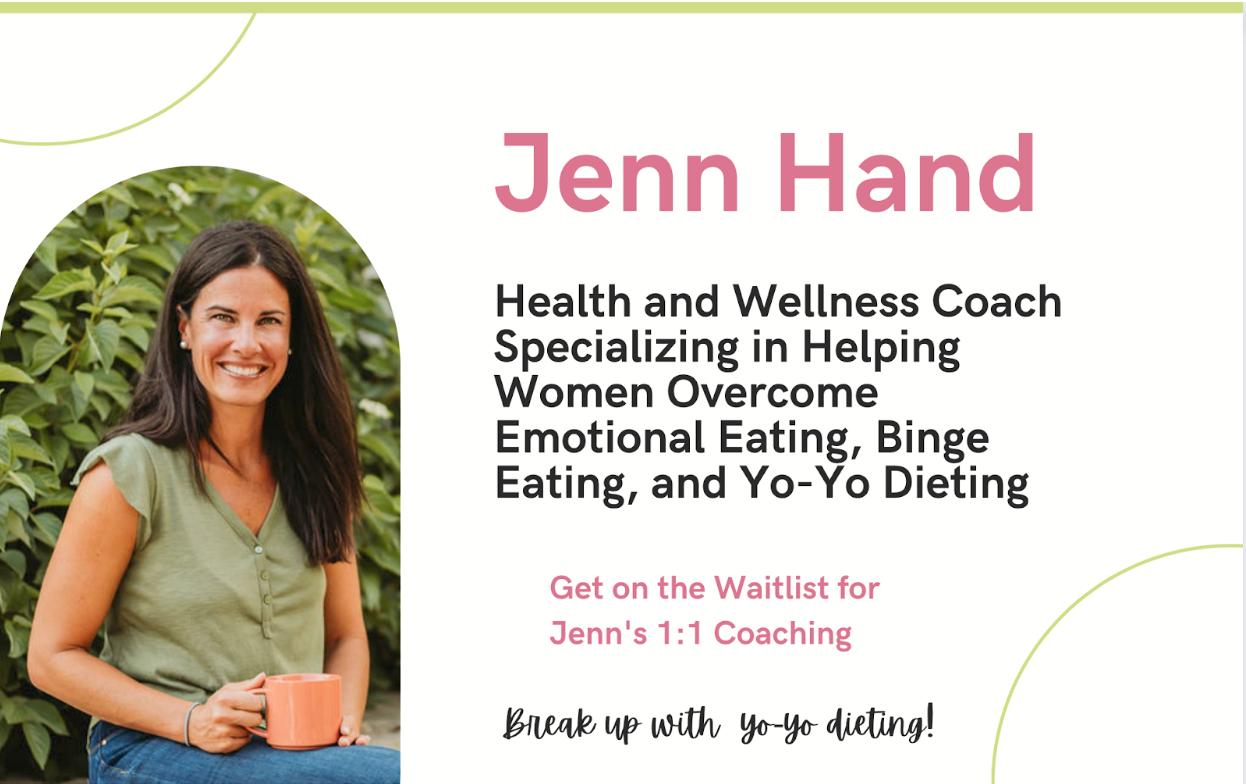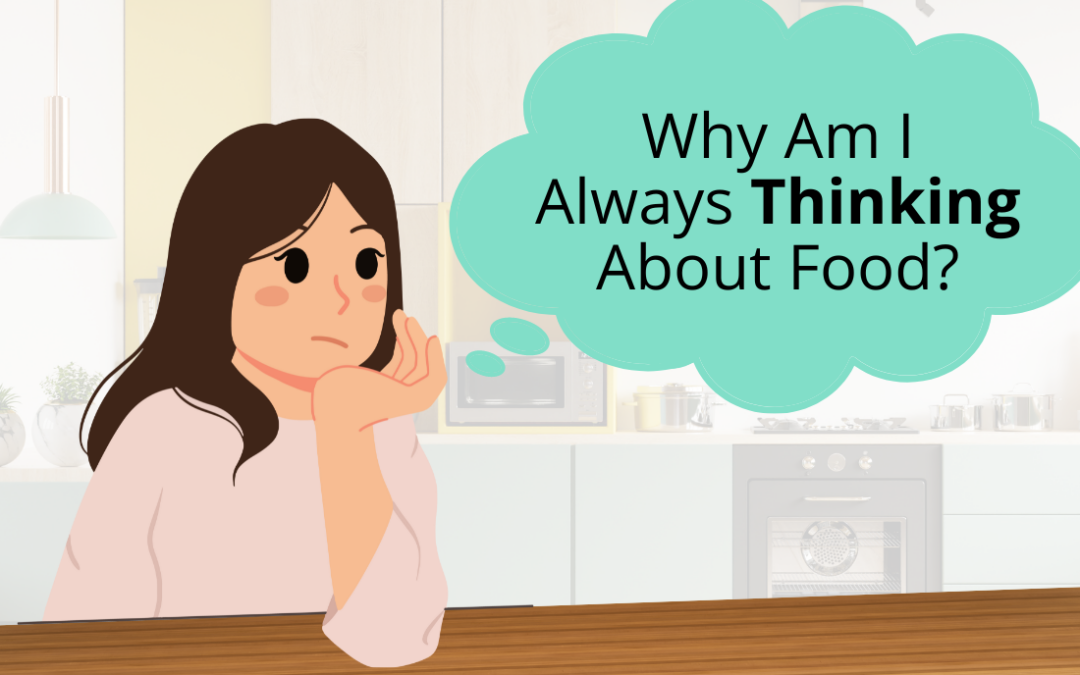Written by Jenn Hand, Holistic Nutritionist, Board Certified Health Coach, NBC-HWC
Why I Used to Always Think About Food
One of the things I desperately desired when I struggled with food was to NOT think about it all day.
Late at night when I couldn’t fall asleep, I’d wish for a day when I didn’t obsess about food 24/7.
The more I dieted, the more I thought about food. I thought if I could just “control” my food, I wouldn’t think about it all day.
As I began to heal, I realized that it was actually the opposite–the more balanced my food became and the less I worked to rigidly control, the more days I spent living rather than obsessing.
If you find yourself constantly thinking about food, it can stem from factors beyond just being hungry. Our relationship with food is complex.
Understanding the reasons why you’re thinking about food can help you develop a more balanced approach to eating.

5 Reasons Why You’re Always Thinking About Food
1. Diet Mentality Hangover
Looking back on my own journey, the more restrictive I was around food, the more obsessed over what to eat/not eat.
If you’ve been dieting or constantly monitoring what you’re eating, your mind may be hyper-focused on food as it tries to navigate between what you want to eat and what you think you should eat based on past diet rules.
2. Challenging Emotions
My autopilot used to default to feel→ eat.
As I began to be aware of my emotional eating patterns, I realized that when I was navigating a hard feeling, I wanted to eat. Stress, boredom, loneliness, or even happiness can trigger thoughts about food as we seek food for comfort, distraction, or celebration.
3. Not Enough Fuel
This is counter intuitive to our diet brain, as it says “less is more.”
I struggled with the concept that I was allowed to eat and my body needed fuel. Not eating enough throughout the day or skipping meals can lead to constant thoughts about food as the body gives you signals to re-fuel.
4. Not Enough Variety
When I ate the same thing on a diet over and over, I thought even more about all the things I could eat when I was “off” the plan.
Eating the same foods and following a diet program can make your mind crave variety, causing you to constantly think about different flavors, textures, and delicious meals.
5. Unmet Nutritional Needs
Your body may be craving specific nutrients that it’s not getting enough of, leading to thoughts about foods rich in those nutrients as your body tries to meet its nutritional requirements. This is especially true if you lack protein!
Questions:
Why do I think about food even when I’m not hungry?
Thinking about food when you’re not hungry is usually an emotional or habitual response. We may want to eat out of habit or to deal with uncomfortable or stressful emotions.
How does boredom affect my cravings for food?
Boredom can cause cravings for food as the mind seeks stimulation, often turning to food for excitement or distraction. We may not know how to deal with boredom and so turn to food.
Why do treats and rewards make me obsess over food?
Treats and rewards can trigger food obsession due to the pleasure and anticipation associated with indulging, creating a desire within us for “more.”
How do advertisements and the smell of food trigger my food thoughts?
Ads and the smell of food can stimulate the brain’s reward centers, leading to heightened food thoughts by activating sensory and emotional cues.
How does my emotional state influence my thoughts about food?
Emotional states can strongly influence food thoughts, especially for those of us who grew up not learning how to deal with feelings. Emotions like stress, sadness, or joy often trigger cravings or cause us to seek comfort through eating.
Can the time of day make me more prone to thinking about food?
Certain times of day are definitely more challenging than others! I’ve found that mid to late afternoon and post dinner are the hardest for most people.
Why do social settings make me think about food more?
Social settings often revolve around food, which can trigger food anxiety, stress, social anxiety and other stressors that lead to thinking about food.
More Related Articles
⚪ How to Get Off the Diet Roller Coaster
⚪ 7 Myths of Weight Loss
⚪ If You’re Not Dieting, How Will You Lose Weight?
⚪ How to Eat Healthy without Dieting
Get the Normal Eater’s Newsletter
Join 8000+ women who are overcoming overeating, binge eating, and breaking up with dieting forever. Get Jenn’s inspiring and actionable weekly newsletter with the latest posts, podcasts, and tips on how to love your body, find food freedom, and lose weight holistically.
Get the Normal Eater’s NewsletterWork with an Emotional Eating & Holistic Nutrition Coach
Overcome Bingeing and Emotional Eating, and Break Up with Yo-yo Dieting
Working with an emotional eating coach and holistic nutritionist can help you get free from the frustrating binge and restrict cycle and stop yo-yo dieting.
You don’t have to be obsessed with food or have a million rules around eating to find your natural weight and learn to love your body. Ready to actually see a lasting change and experience true freedom?
Schedule a 20-min CallAbout the Author:

Jenn Hand has been helping women like you become normal eaters since 2015.
She’s worked with thousands of women, helping them to balance their bodies, end bingeing, stop obsessing over food, and start feeling amazing again. As a board-certified health coach and holistic nutritionist, Jenn knows how to support you in making real positive changes that last.
Her articles have been published on Mind Body Green, Tiny Buddha, Thrive Global and other local and global media platforms. She’s the author of How to Be a Normal Eater and the creator of The Normal Eater’s Club program. Listen to Jenn’s advice and tips on the Cake Doesn’t Count Podcast, or read more of her articles for free on the Food Freedom Blog.
Learn About Coaching!




